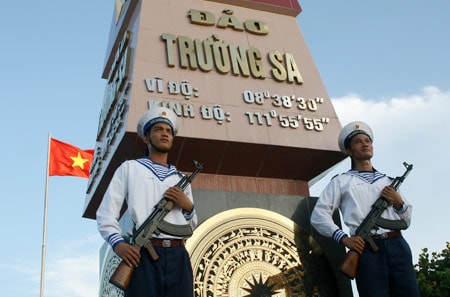Sovereignty, sovereign rights and jurisdiction
(Baonghean.vn) -Question 8. What is the significance of the issue of sovereignty, sovereign rights and jurisdiction over maritime zones and territorial sovereignty over the Hoang Sa and Truong Sa archipelagos as recorded in the Law of the Sea of Vietnam?
Reply:Firstly, in the contents of the Law of the Sea of Vietnam, the contents regulating the scope of Vietnam's sea areas under national sovereignty, sovereign rights and jurisdiction, emphasizing and regulating the sovereignty of the Vietnamese state over archipelagos such as Hoang Sa and Truong Sa are very important contents of the Law of the Sea of Vietnam that both domestic and international attention is paid to. Those two contents in the Law of the Sea of Vietnam have been expressed quite fully, indicating how the scope of internal waters, territorial waters, contiguous zones, exclusive economic zones, and continental shelves are determined and what the specific legal status of those sea areas is.
 |
| Emphasizing and regulating the sovereignty of the Vietnamese state over archipelagos such as Hoang Sa and Truong Sa are very important contents of the Vietnamese Law of the Sea. Illustrative photo |
Second, the Law of the Sea of Vietnam has clearly stipulated the principles for resolving disputes related to the delimitation of overlapping maritime zones in the East Sea. Based on that principle, we have successfully negotiated with a number of relevant coastal countries, for example, the negotiation and signing with China on the delimitation of the Gulf of Tonkin - a typical treaty for the process of applying the Convention, typical for resolving overlapping zones. We maintain that form to negotiate and resolve overlapping zones, by peaceful negotiations, to reach a fair solution that the parties can accept, and necessarily based on the Convention. Parties who want to resolve the problem clearly cannot rely on factors other than the Convention. Any person in the negotiation who sets standards other than the Convention will lead to prolonged complications and disputes with serious consequences.
We must reiterate that firmly, if we are to resolve disputes at sea - an important dispute is to determine overlapping areas, it must be based on the Convention. In addition, there are other disputes about fishing, exploration and exploitation, environmental protection of resources in sea areas due to the movement of ships, then the parties must sit together, or bring them to international judicial bodies as prescribed by the Convention. Resolving disputes by judicial mechanism is a peaceful, civilized, cultural measure. If when a dispute arises that the parties cannot resolve themselves, they must seek help from international judicial bodies to consider and handle right and wrong. If someone does not want to bring the dispute to a judicial body when it cannot be resolved through bilateral or multilateral negotiations, it is clear that they want to go into a dead end and cause unnecessary conflicts. Vietnam's Law of the Sea has affirmed that consistent stance of Vietnam. That demonstrates the goodwill and determination of the Vietnamese State in handling all disputes at sea.
Third, the Law of the Sea of Vietnam mentions the sovereignty of the two archipelagos of Hoang Sa and Truong Sa, although the Convention does not mention the settlement of territorial sovereignty disputes. However, it is important and very consistent with this Convention that the Law of the Sea of Vietnam mentions islands, archipelagos and the effect of islands and archipelagos in determining the scope of their maritime zones, including the content that has been affirmed that small islands, unsuitable for human habitation and without their own economic life, do not have their own exclusive economic zone and continental shelf. That means we oppose countries that make any regulations contrary to the Convention and go against international common regulations in order to legitimize their ambitious maritime border claims in the East Sea.
The Law of the Sea of Vietnam has affirmed that the Hoang Sa and Truong Sa archipelagos belong to the inviolable sovereignty of Vietnam. At the same time, we reiterate Vietnam's consistent stance in resolving territorial sovereignty disputes over these two archipelagos through peaceful means in accordance with the principles of international law and practice.
The principle of actual possession is the basic principle applied to resolve territorial sovereignty disputes. Vietnam was the first country in history to take possession of the Hoang Sa and Truong Sa archipelagos when the red islands were still ownerless. The exercise of sovereignty is clear, continuous, peaceful, and is an internationally recognized principle widely applied in resolving territorial disputes. We are very willing to negotiate. Previous Vietnamese states have raised this and we are also willing to do so now. In the Law of the Sea of Vietnam, it is affirmed that Vietnam is willing to negotiate with relevant parties to resolve all disputes on the basis of the 1982 UN Convention on the Law of the Sea and international law. That is Vietnam's goodwill. In reality, Vietnam has successfully implemented that goodwill, because all parties respect objective truth, have goodwill and are open to negotiation.
(According to Q&A on Vietnam Law of the Sea)
More






